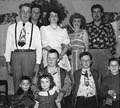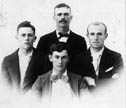James Eddy Cleaver family
written by Helen Louise Cleaver Gage,
for publication in a Columbia, Missouri newspaper in 1971 or 1972.
NOTE: Please click on picture thumbnails (below) to see larger version and a detailed caption.
 JAMES EDDY CLEAVER was born in Gadrich, Ontario, Canada. He was the oldest of six children -- two girls and four boys. His mother was Catherine Eddy Cleaver,
JAMES EDDY CLEAVER was born in Gadrich, Ontario, Canada. He was the oldest of six children -- two girls and four boys. His mother was Catherine Eddy Cleaver,  a full blood French Canadian woman. His father, John Cleaver, was a doctor, and made his calls with horse and buggy, often through deep snow and bitter cold. There were no cars then. Dr. Cleaver was dedicated to his work and put in long hours -- thus went to an early grave at the age of forty-seven years.
a full blood French Canadian woman. His father, John Cleaver, was a doctor, and made his calls with horse and buggy, often through deep snow and bitter cold. There were no cars then. Dr. Cleaver was dedicated to his work and put in long hours -- thus went to an early grave at the age of forty-seven years.
The family later moved to Tabor, Iowa and then to Malvern, Iowa. James Eddy Cleaver was forced to quit school in order help support the family. His mother was always frail, but lived to be ninety-one and is buried in Tabor, Iowa.
James Eddy Cleaver worked in a packing plant in Omaha, Nebraska, which is thirty-five miles from Malvern, Iowa. At the age of twenty-eight, he met and later married Lizzie Guilford, who lived with her mother and three sisters in Malvern, Iowa. Two daughters were born to the Cleavers while in Malvern -- Mary Catherine and Helen Louise.
Mr. Cleaver's health was failing, and his doctor advised him to go to a higher, drier climate. He took the doctorís advice and left his wife and two daughters with Mrs. Cleaver's mother. He journeyed to the Black Hills and filed on a homestead in Fall River County in what is known as Dudley Canyon. He built a small house and sent for his family, who followed when Mary Catherine was two years old and Helen Louise was six weeks old. Two other children were born to them later -- Chatta Ella and Jonathan Evart. Mr. Cleaver soon regained his health in the clean, fresh air of the Black Hills.
He went into the cattle business and soon built up a nice herd of Hereford cattle. He branded them T. Y. as he had named his homestead -- the T. Y. Ranch. In 1907, Mr. Cleaver purchased the large Smithsonian home on College Hill and moved his family into Hot Springs here the children would be closer to school. However, before they moved into town, the children often walked over Battle Mountain (see map) to attend school or were taken into town with team and buggy. Mr. Cleaver kept the ranch and cattle and either took care of them himself or had a renter on the ranch.
The spacious home the Cleavers purchased was perfect for entertaining, and Mrs. Cleaver was never happier than when she was entertaining her friends or the childrens' friends. That home was often the scene of many happy gatherings -- class parties, dinners, etc. These events will always be remembered by those who shared them. Some have passed away but some are still here. Mrs. Cleaver was always a good neighbor. One friend tells how she drives with horse and buggy six miles down Fall River road and worked all day helping a friend get the family ready for a train trip.
After moving to town, Mr. Cleaver purchased an interest in the Berrier Butcher shop and worked with Mr. Berrier for several years.
Before Mrs. Cleaverís death in 1930, the family spent many summers at their cabin on Rapid Creek. They traveled by wagon and teams. There were no cars then. It took about three days to make the ninety mile trip. It was a rugged trip, unbelievably so compared to the highways we now have - and of course cars to travel in. Mr. Cleaver drove the camp wagon and team, and Mrs. Cleaver drove a double seated buggy and team. Mary and Helen usually rode a saddle horse. These horses were also used to look for good campsites and it was not uncommon to hitch a saddle horse to the front of the wagon to help pull the wagon on through mud holes or over corduary roads. These roads were made by placing slabs or railroad ties side by side over mud holes and swamps. There was no way but to go through on the narrow roadway.
We camped by clear sparkling trout streams, pitched two tents, and cooked over an open campfire. At night we kept the fire going to keep the mosquitos away. Bedtime usually came with darkness after a hard day on the road. At that time the woods teemed with grouse and the streams furnished delicious speckled trout which helped make the evening meal.
Deer grazing along the roadsides was very common to see, and they paid little attention to us passing by. With the good highways we now have, and many campsites, the good fishing and hunting vanished. Good roads and cars brings too many people to occupy and destroy "Nature's Gifts" to mankind. I doubt the good fishing and privacy of those days will ever return.
While at our summer camp, we picked and canned hundreds of quarts of wild red raspberries which made delicious eating for the coming winter months.
The stream running by our cabin was ice cold, but in spite of that I remember we children took a swim most days and called it fun. We were young and full of pep then, of course.
We all graduated from Hot Springs High School. Mary and Helen attended college in Cedar Falls, Iowa, Chatta went to college in Omaha, Nebraska. Jonathan went to Brooking, South Dakota to college. There he met and later married Ruth Caldwell. They had one daughter, Barbara June. Barbara graduated from college in Oregon, and later she met and married Bob Kroll, a chemist for DuPont. They live in Pennsylvania and have one daughter, Christy. Jonathan passed away in late 1947 -- just a few months after Mr. Cleaver passed away.
Mary Catherine met and married Harry R. Woodward in 1918. He was the principal of the High School at the time and later became Superintendent, serving the school for thirty three years until his sudden death, November 14, 1955. They had two sons, Harry, Jr. and James Quentin. Harry Jr. is now head of the Fish and Game Department of the State of Colorado. He married Theone Weldon, and they have three children, Terry, Kay, and Robin. They live in Denver. Quentin married a girl from Switzerland , and they live in Salt Lake City, Utah. He works for the government, and they have no children.
Chatta followed in her fatherís footsteps -- she loved the out of doors and to handle the stock. She can do just about anything a man can do with stock on a ranch. She took over the ranch and now has a nice herd of Hereford cattle. She also has a summer home up in the Hills near Custer, where during she summer she often entertains friends and their families.
Helen Louise flies back about every summer to visit old friends and Mary and Chatta. Helen says, "The Black Hills will always be God's Country to me". My roots are deep there and I shall always thrill to the thought of returning and visiting Fall River County and old friends. She says you do not forget the mountains when you have grown up among them.
 Charles Gage was born in Bay City, Illinois. He left home in his late teens and went to Denver, Colorado to learn the barber trade. While there he heard glowing accounts of the beauty of the Black Hills, so he later went to Hot Springs and worked for Bert Shirley who owned a barber shop there. Helen Louise was home from college at that time, and Marion Lessard, (a close friend, now deceased) called Helen and told her Charley Gage wanted to meet her -- so arrangements were made and Helen met, and later married, Charley Gage.
Charles Gage was born in Bay City, Illinois. He left home in his late teens and went to Denver, Colorado to learn the barber trade. While there he heard glowing accounts of the beauty of the Black Hills, so he later went to Hot Springs and worked for Bert Shirley who owned a barber shop there. Helen Louise was home from college at that time, and Marion Lessard, (a close friend, now deceased) called Helen and told her Charley Gage wanted to meet her -- so arrangements were made and Helen met, and later married, Charley Gage.
They bought the Log Cabin Candy Kitchen from Claude Coffing. Charley learned to make all kinds of candy, even the Christmas candy with the stripes in it. They built two homes in Hot Springs, the first they sold to Joe McDonald. They had two children, Charles Cleaver and Cloris Marilyn. In 1934, when the children neared college age, they moved to Columbia, Missouri (a college town). In Columbia, Helen became a beauty operator and they owned and operated the All States Barber and Beauty Shop for seventeen years. They also invested in real estate. Columbia was growing fast. They all loved the out of doors and soon bought a cottage and motor boat on the "Lake of the Ozarks," where they spent weekends and holidays with their family boating, fishing, and water skiing.
Their son, Charles Cleaver Gage, after graduating from the University of Missouri, made a career of the Army. Before going into the Army, he met and married Erma Christine Shults of Blue Mound, Illinois, who had been attending Stevens College in Columbia. Charles Cleaver Gage attained the rank of Colonel before being stricken with a heart attack in 1963. They have two sons who survive, Charles Michael Gage and Glenn Franklyn Gage.
Cloris Marilyn Gage, after graduating from high school, learned the beauty business working with her mother, but she preferred to be a secretary. She met and married Otis Lavon Gibson of Columbia. O.L. is a salesman for Citizens Lumber Company in Columbia. Cloris has been the supervisor of the Radio and TV department at Stephens College for 10 years. They have three children, Charles Otis Gibson, Don Sherwood Gibson, and Linda Kaye Gibson. They are all married and live in or near Columbia.
After the Gages sold their barber and beauty shop, they bought a farm and are now retired and raise Hereford cattle. They own saddle horses and four lakes stocked with fish, so they still continue their out of door activities and are often accompanied by some of their grandchildren or some of the great grandchildren.


